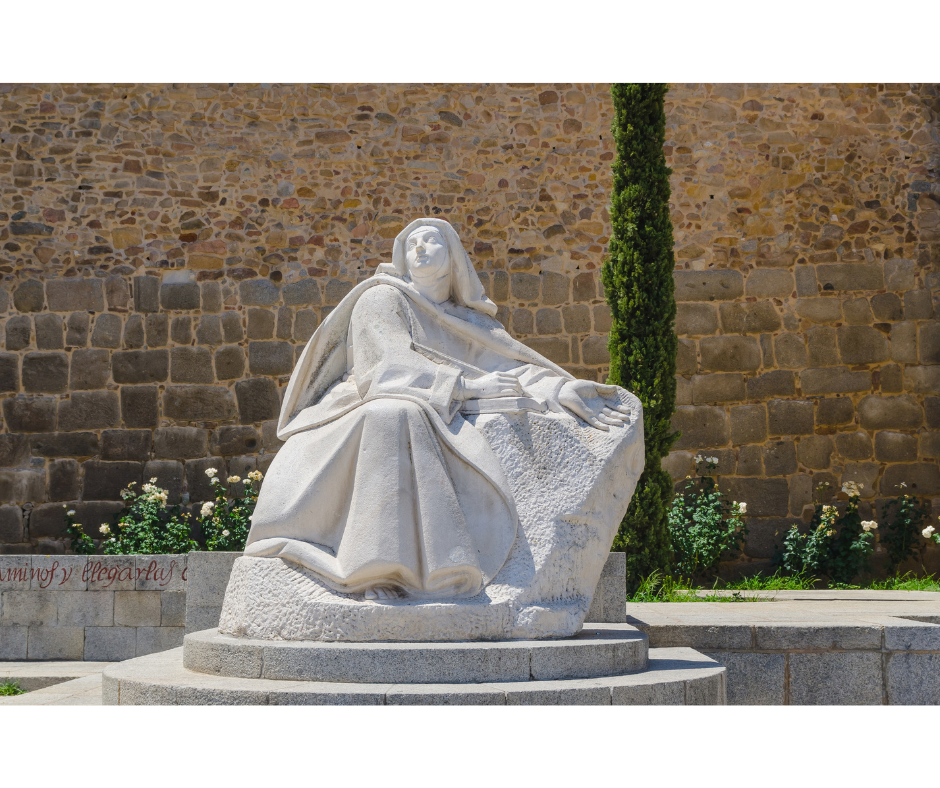
As the celebration of Easter Day fades, and we journey into the Easter season, I find myself reflecting on what it means now to live into resurrection. I celebrated the glorious redemption of Jesus’ body—his wounds have been transformed, alleluia! And yet, there are many bodies around me that are still suffering, who’s wounds have not been healed and will likely not be in this lifetime. What does bodily redemption mean for them? When will these beloved members of our parishes, communities, and families say their alleluias?
I think Saint Teresa of Avila—a doctor of the Church and trusted spiritual director to her peers—can help shed some light on these questions. From childhood, Teresa delighted in spending time in contemplation, and is said to have repeated over and over, “Forever, forever, forever, they shall see God.” Yet, she also experienced severe illnesses intermittently throughout her life. These illnesses occurred in her childhood, as a young adult, and finally, in the two years preceding her death.
During her life, Teresa had visions and lived ascetically, established a reformed Carmelite order, and traveled for 25 years all over Spain, founding 17 convents. Seeing into the spiritual nature of things was her hope and her specialty. After a lifetime of reoccurring physical pain, Teresa’s last words harkened back to her early devotion to God as a youth, “O my Lord! Now is the time that we may see each other.” Teresa still held onto her hope that what she had seen of God in part, she would one day see fully.
Throughout her life, Teresa had been well acquainted with the deep longing of her soul to know Christ face to face, and – in light of her ongoing illnesses — no doubt, she longed to see Christ’s redemption in the suffering of her physical body as well. Yet, while she became a doctor of the Church and a revered saint, she was never physically healed.
Teresa’s writing echoes St. Paul when he says, “the whole of creation has been groaning in labor pains until now; and not only creation, but we ourselves, who have the first fruits of the Spirit, groan inwardly while we wait for adoption, the redemption of our bodies” (Romans 8:22-23). Throughout our lives, we live in this paradox: the Spirit is alive and active in us, and we long for God’s wholeness to be made manifest in the temporary vessel of our physical beings.
One means of experiencing this wholeness is to join in the prayer that God’s Spirit is praying in each one of us right now. Paul continues the passage above with, “the Spirit helps us in our weakness; for we do not know how to pray as we ought, but that very Spirit intercedes with sighs too deep for words” (Romans 8:26). In other words: the Spirit goes to the deepest places in each one of us that no one else can reach to bring comfort, peace, and counsel. Joining in this sacred work of the Spirit allows us to receive the Spirit’s offerings more fully. We join in this work through our own Spirit led prayers, meditation, contemplation, silence and listening, rituals and devotion, and healing practices. In short, we join in the Spirit’s prayer in us through our own active surrender.
Teresa does this when she recites, “For ever, for ever, for ever, they shall see God.” She was joining in the particular prayer the Spirit was praying in and through her. There is a prophetic quality to these words, as the Spirit is simultaneously speaking of what is to come and calling it into being — not just for Teresa, but for all of humanity, including us. A holy healer, Teresa reminds me that as we put our hope in Christ, in sickness and in health, we will be able to join in God’s prayer being spoken “with sighs too deep for words.” Teresa’s steadfast devotion reminds me that we will see God, today in part and one day fully. While our physical pain may persist, so does the Spirit’s presence, and that is a reason for us all to say Alleluia.
